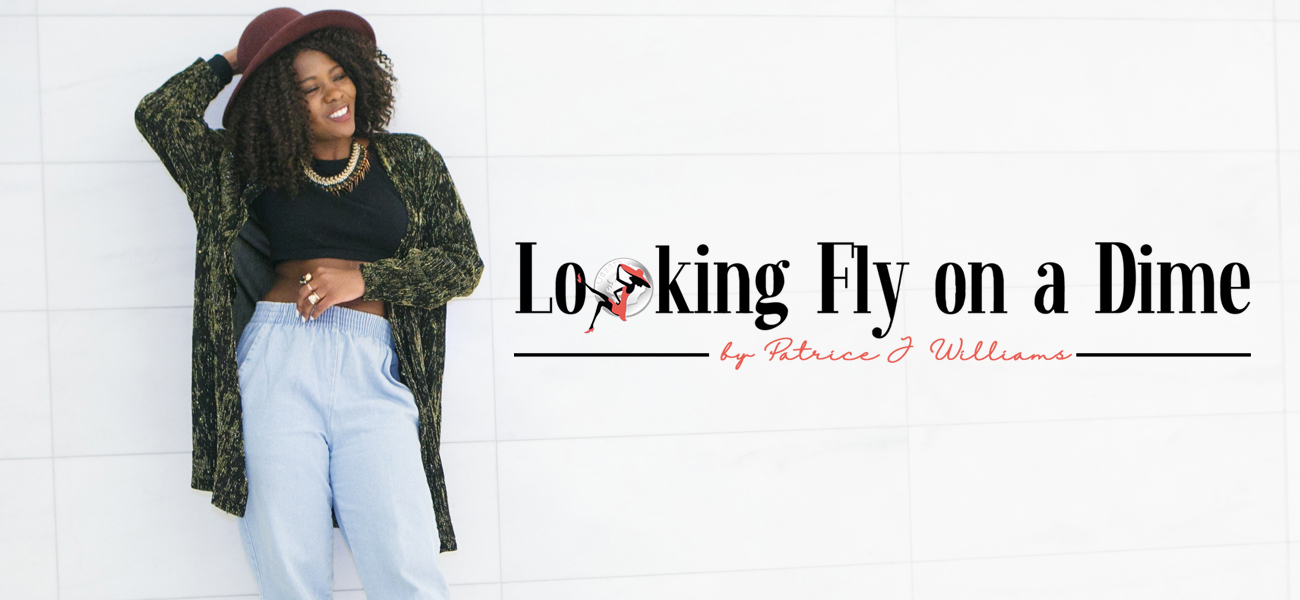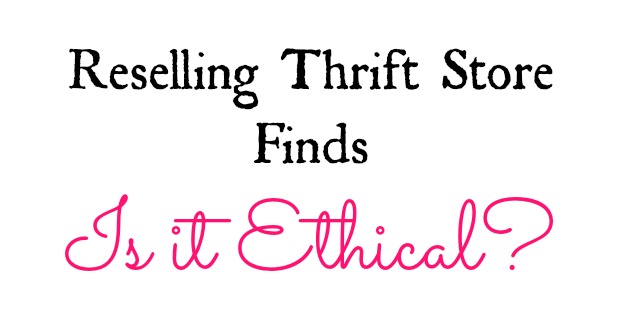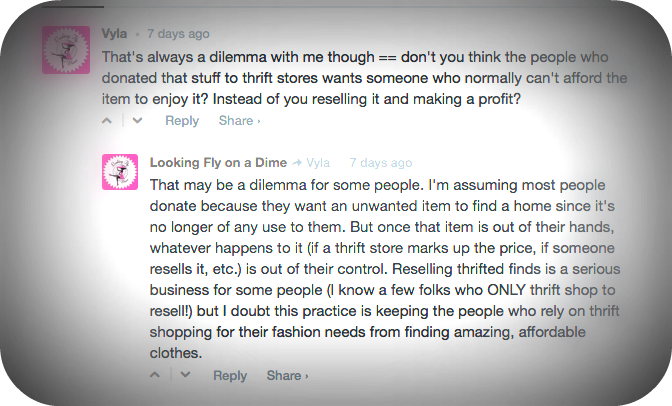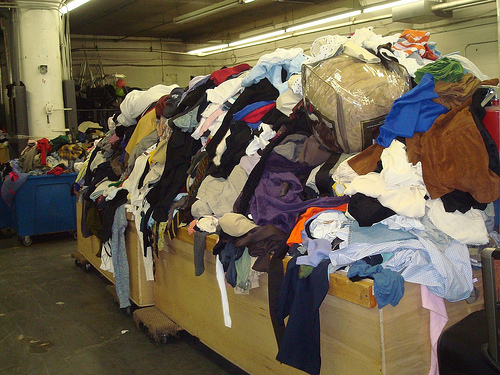
15 May Style Discussion: Is It Ethical to Resell Thrift Store Clothes?
Last week a reader commented and asked a question I’ve heard before. Of course I responded directly to her but since this isn’t the first time the question has come up, I decided to blog about it and see what you guys think.
After writing my 3 Tips to Selling Clothes Online {clothes you’ve outgrown or amazing pieces you thrifted}, Vyla asked: “…don’t you think the people who donated that stuff to thrift stores wants someone who normally can’t afford the item to enjoy it? Instead of you reselling it and making a profit?”
I can understand why some people would have an issue with or feel conflicted about making a profit off of something that was donated as an act of charity.
My direct response was:
There’s no denying the world of thrift shopping has changed. It used to be for people who couldn’t afford clothes. And this used to be me in college and when I first moved to NYC and was earning $27k/year working at a fashion magazine. Though I can shop at major department stores now, I still choose to thrift.
Due to thrift shopping’s popularity, it’s for people of all walks and every income bracket. People who would normally never step foot in a secondhand shop are now proud thrifters who either shop for their own closets or search for gems they can resell.
That’s where the quandary comes in.
Since everyone isn’t there with the same intention, the final resting place of the garments in the thrift store can vary.
I do resell some of my thrifted finds, either after I’ve worn them or if it’s a great piece I can flip for serious cash. At the Salvation Army coat sale last year, I scored a DSquared rabbit fur lined parka for less than 5 bucks. I wore it once, realized it wasn’t my style and then resold it for a few hundred dollars {this coat was originally priced at a little over $1,000}.
When I donate clothing to a secondhand shop, I have no idea who’s going to scoop it up. Maybe my items will end up with a college student on a Ramen noodle budget or a Brooklyn hipster earning $80,000 a year. And maybe the person will wear the clothes or maybe they’ll resell for a few dollars. The only thing I know for sure is I want my clothes to find a good home and not end up in the trash.
But those are just my thoughts…now it’s your turn.
Is reselling thrifted clothing unethical? Do you think it’s fair to make a profit off of a charitable donation? Are people who really need affordable clothing being affected? Does reselling somehow impact thrift stores?



Thrifty Chic
Posted at 09:02h, 15 MayI’ve resold quite a few stuff from thrift stores. I don’t see anything wrong with it but I guess I understand why some people would.
Carol
Posted at 18:32h, 23 SeptemberFreeclothes……freestuff
Danielle B
Posted at 11:12h, 15 MayWhen people buy EVERYTHING in a shop (well, not evertything, but they grab a ton of stuff, that they’re only going to resell), that’s when I think it’s wrong. They’re not being considerate of others who want or need to shop at thrift stores.
John
Posted at 09:13h, 10 MayIncorrect. If I walked into the store, and said I will take every single thing that is on the shelves, meaning that after I left the store was completely empty – that is not only my right, it is ethical. The stuff is for sale. There is no obligation to leave anything. There is no obligation to buy anything. If the store tells me that they do not want to sell me certain items, it is their right – but unless posted, THAT would be unethical.
There is no obligation to “leave things” for others. If the store is in the business of selling only to lower income and needy people, they need to state this, and then do an eval.
Otherwise, back off and I’ll buy what is for sale.
Suburban Style Challenge
Posted at 12:32h, 15 MayI don’t see anything wrong with it. I’ve resold items from thrift shops and clothing swaps before, and it was always after I realized “yikes, this isn’t for me”. If doing something with a thrifted item of clothing besides wearing it as it was intended is wrong, then I suppose my desire to use thrifted clothing for craft projects is unethical too, in the minds of some. :shrug: Can’t win ’em all I guess, right?
I figure that thrift stores have a constant stream of things coming in and that if I pick up one single item and sell it a few months down the road, or destroy it in a failed DIY attempt, I didn’t take anything away from anyone, because chances are, something similar or even nicer came along, and someone else was able to buy it and do with it what they wanted/needed.
Debbie Mayumba
Posted at 12:53h, 15 MayThere is nothing wrong with reselling from the thrift shop. People also don’t realize that many of the clothes that are not sold from a thrift shop end up in a warehouse distribution center and those clothes are sold to people all over the world in bulk–many to 3rd world countries. Those clothes are then resold all over again!
I sell vintage items and am always at the thrift shop looking for vintage finds. Its a way to find things at a decent cost in order to resell them at a decent cost (unless its a very valuable piece.)
We are like finders who are paid a finders fee.
Rosemary
Posted at 13:25h, 15 MaySadly, the people who really NEED to shop thrift stores, cannot afford the prices some thrift stores are putting on things!!!
myblackfriendsays
Posted at 22:21h, 15 MayI think that the people who donate are donating so the non-profit thrift store can make some money by reselling an item that the organization paid zero dollars for. I don’t think donors are giving the items so some less fortunate person can get inexpensive clothing. And even if they are, it’s like six of one/half a dozen of the other. The thrift shop prices the item for what they think it can sell it for, and when it sells, they make money. That’s where the good deed comes in.
And even if people do resell stuff–the reseller is making a living (they might be broke otherwise) and the person buying the item at a jacked up price is still getting it at a price that they think is fair. it’s a win/win/win/win.
Sandra Saint Jean
Posted at 12:55h, 16 MayWhat about the people who get the thriftier items and customize it or show you what you could wear it with? A lot of times we see something, and overlook it..but when someone shines a flashlight on it (like you do) I think that deserves a prize lol
Donna Perry
Posted at 05:08h, 17 MayGreat response Patrice..
Lyddiegal
Posted at 23:14h, 20 MayWhen I donate to the thrift store, they get to sell it, make their profit and then that money services the charity. I don’t really think about the customers themselves as being the charity, because like you said, anyone can shop there.
Furthermore, I’ve noticed thrift stores pricing designer things a lot higher than anyone with a poverty level income can afford. Like an old Coach bag, for $70 at Goodwill. If I wanted to buy it and then try to resell it for more, who cares? Goodwill got $70 and only someone with a higher income could have bought it anyway.
Johney Duke
Posted at 04:04h, 17 AprilIt’s my fortune to go to at this blog and realize out my required stuff
that is also in the qualitybubblegum
casting reviews
Lance M Roberts
Posted at 06:52h, 03 MayEnthralling
stuff I haven’t been finished particular data in a lasting time.
click
this link now
Mike tyson
Posted at 08:15h, 12 MayThe information in this blog is extremely useful for the
people.
cheap
life insurance
devhilton
Posted at 07:13h, 13 Mayclick here
Your
work article, blogs I mean over all contents is must read material.
vacumecleaner
Posted at 02:47h, 14 MayI really
delight in whilst I go through your blogs and articles.
phlebotomist
certification
Raul Wint
Posted at 07:38h, 15 MayThis is
one of the most important blogs that I have seen, keep it up!
sky
blue credit reivews
Raul Wint
Posted at 07:39h, 15 MayWell,
it’s a nice one, I have been looking for. Thanks for sharing such informative
stuff.
lexington
law reviews
Albert einstien
Posted at 07:42h, 02 JuneUnexpected
work you people do with this webpage.
cancer awareness
Peg
Posted at 09:33h, 18 JuneI recently read an article that approached this topic in a whole new light. Thrift stores are in the business of making money For Their Charity. All shoppers are welcome because whatever isn’t given away directly to people in need, has to generate enough profit to provide Financial Assistance & keep the store Open! It is actually very costly to operate a business with retail space. Providing items to re-sellers affords them a way to make or supplement an income, keeping some of them from welfare or assistance. Win-Win
Kenny Mathews
Posted at 06:29h, 04 SeptemberI think its nothing bad to shop From a Resale Shop or Consignment shop. I found this article really informative. Thanks for sharing this stuff with us.
Nicole
Posted at 17:10h, 09 AugustI think reselling thrift shop items (at a FAIR REASONABLE price), is completely ethical and arguably the most ethical.
Encourage people to buy used clothes, not support fast fashion brands churning out new clothing using sweatshop labor. (BTW sweatshop labor isn’t just underpaid workers using sewing machines, it’s workers who die because buildings collapse and aren’t maintained all in the name of “low prices” at Forever 21, die in building fires, don’t have money to take care of their children and send their own children away to live with family, people who are so poor that they can’t even live like decent humans).
Encouraging more people to buy thrifted clothes is incredible for the environment because the more we buy thrifted clothes, the more times the thrift shops will need to restock their shelves rather than dump more clothes in landfills.
Only a small percentage of your donated clothes will end up in thrift stores because not enough people buy from thrift shops (do the research, you will find most of your donated items end up in landfills or shipped in giant bales to developing countries). In many developing countries that are inundated with donated clothes, native clothing makers and designers can’t sell, because the market is being dominated by a bunch of American T-shirts and jeans that got dumped there.
Not everyone would consider going to a Goodwill store, but if we help bring out the best in some of these clothes, that people might never otherwise see, we might be helping stock someone’s closet without harming the environment or supporting the horrible fast fashion industry. When a cute top or a beautiful dress is only a click away, AND it’s thrifted, good people will try to use that option. Thrift store clothing needs to be made more visible, so that we can support recycling rather than dumping clothes in landfills and then going to H&M.
Lucy Rose
Posted at 12:10h, 12 OctoberI think that it is a fair business venture. If you buy something at a thrift store you are offering them the exact price they asked for in purchasing. They probably couldn’t even sell it at the price you could get for it online. It is a fair deal also, because you are doing the work of selecting, photographing and maintaining the business online.
Lynlee Pointer
Posted at 12:39h, 19 JanuaryI feel like the thrift stores are making money off the clothes. If I pay for it then it is mine and I can resell if I want, too.
Kath
Posted at 21:49h, 08 AprilI used to feel the same conflict, but these days I don’t. We regularly buy from thrift stores, or op-shops as they’re called in Australia. In fact, most of our toys, books, clothes, shoes and household items are bought from op-shops. We are a single income family and we just couldn’t afford to buy items at full-price all the time, especially for children who grow so fast. Because we are regular supporters of our local and more-distant op-shops, I know I’m not exploiting them just for the sake of re-selling. I re-sell their cheap books, and my business is aimed mostly at other homeschoolers who can’t afford to buy at new price. So I buy them cheap and re-sell them with a small profit margin. This gives me funds to pay for my children’s educational supplies and activities. As far as I can see, if I’m not just in there to find re-sellable items, and I’m giving our unwanted items to them, buying everyday items from them and buying what we call ‘recycles’, then it’s a win-win for everyone involved, and our local op-shops always have more than they can sell.
Tiff
Posted at 22:03h, 08 AprilA lot of thrift stores rely on the revenue to subsidise their charity. They rely on people from all walks of life to spend and donate. My mother used to manage a thrift store and she said if they relied solely on the ‘needy’ they couldn’t keep going as a charity. When I was unemployed I couldn’t afford to buy anything new or second hand. Now that I am working full-time I love thrift shopping for getting unique bits and pieces and for making my classroom budget go further. If I wanted to resell these items I would have no worries about this – people will pay what they feel comfortable paying and I will continue to support local thrift shops. If you are buying to on-sell you still have to put a lot of time, effort and money into it.
Miranda
Posted at 23:00h, 08 AprilI don’t have a problem with people buying something, realising it’s not for them and reselling it. Or even individuals who buy the occasional thing becaise it’s an amazing find with the intention of selling it on eBay etc. What I do have a problem with is businesses scouring second-hand shops, and reselling at a massive profit. My reasoning being, thrift shops are not middle-of- onsellers, and by people treating them as such it decreases the appeal of their store (I know shops that buys regularly strip of anything at all brand name or lovely, so there’s nothing left when normal people come in). To me, benefitting economically from the low prices at thrift shops (which, while it is no longer the case at all thrift shops, started as a way to make buying clothing more accessible for poorer people) is abusing the charity of the thrift shop. HOWEVER if the shop in question is one clearly not targeted at lower socio-ecomic demographics (ie higher prices) I don’t have a problem with it. I also just think it’s sad in general that I rarely find nice things in thrift shops anymore, as they’ve been bought by “vintage” sellers.
Hattie
Posted at 20:01h, 09 OctoberI wonder who “deserves” to buy the nice things more: the comfortably middle-class person who wants something nice for their house at a cheap price, or the lower class person who is shopping at thrift stores as their job? If a Goodwill can either provide people with fancy stuff, or provide somebody with a job, I think the second is more beneficial overall. Plus, in the second case, the item is still going to someone who wants something nice for their home!
JO
Posted at 06:24h, 10 AprilI’m on a disability pension and I resell things online to make a bit of pocket money o sure am not living it up on the profits but it helps me have a bit more to make ends meet , I don’t see it being an issue , the charitys still get there money either way and I still donate loads to the charitys so it’s a win win in my books , I don’t care what happens to my donated things once it’s pasted through the charitys hands at all .
Melissa Husted
Posted at 00:03h, 14 OctoberActually, it’s an excellent use of the world’s resources as well as a prime example of the free market. This should please BOTH sides of the aisle.
There is just too much clothing being manufactured today. The demand is high, but with cheap labor (read: overseas), the supply is even higher. So what happens to this excess clothing? It gets dropped off at thrift stores at a much higher rate than it can be sold by the thrift stores. They are always having to clear their racks for newer items. So they sell the excess to textile companies who sort the usable stuff from the junk. What is usable is sent overseas to clothe people in 3rd world countries. The rest is used to make rags, or something. So as you can see, there is PLENTY to go around. By buying things to resell you are definitely NOT taking the clothes off a less-fortunate person’s back. In fact, you are actually doing a couple of very responsible things in addition to providing for yourself or your family. 1. You are reducing the processing load of the extra garments that would otherwise end up as rags or in landfills. 2. By selling items, you are entering the marketplace. The market only needs so many clothes, so you are actually reducing the DEMAND for the cheap clothing. Lower demand, lower production. 3. You are helping spread wealth. People who care about fashion, and would otherwise spend excess money with retailers can now buy from you. This leaves them with more disposable income to either save, give, or improve their lives in some way.
To sum up, by selling thrifted items, you are having a direct hand in preserving both the environment AND the economy.
Jennifer
Posted at 19:20h, 02 NovemberI’m not a fan of a lot of the resellers I’ve seen on social media. I have followed a few on Instagram & YouTube and, I can’t quite put my finger on it, there is a shadiness about many of them, that I just don’t like. Usually when I donate clothes, I cut the tags out of any higher end items to make it harder to resell. It’s petty I know, but it makes me feel a little better that some reseller might pass it up for that reason and someone who actually wants to wear it will get it for a good price.
Hattie
Posted at 20:13h, 09 OctoberThe more people can resell, the more people can have jobs. If someone buys a purse for $5 at a thrift store, Goodwill gets $5 and that’s it. If someone buys the bag for $5 and resells it for $50, Goodwill gets $5, the reseller is able to keep their job, AND someone who can afford it gets a purse that they like.
I enjoy reselling but it’s not like it’s hugely profitable! I spend time driving to thrift stores, looking through them, and paying for things: that’s the fun part! Then comes preparation: cleaning and maybe fixing, setting it up and taking photos from different angles, uploading photos, writing out the ad, weighing and measuring to determine shipping price, figuring out the price, paying to list it, then putting it away safely until it sells. Once it sells, there’s packing it, labelling it, and taking it to the post office. Other costs include envelopes and packing materials like tissue paper and tape and protective sleeves, and ‘extras’ like stickers and notecards. Then the website I sell on takes about 15 to 20 percent. Even if I sell things for ten times what I bought it for, it averages out to maybe about ten dollars an hour, and I don’t think I’m that slow! When I look at the “I make 100 000 a year flipping thrifted finds’ blog posts, they usually feature items that I would be lucky to find twice a year 🙂
Brant
Posted at 20:32h, 05 MarchI struggled with this as well when I first started reselling thrift store items. If I’m not mistaken, I think even the CEO of Goodwill said that it was ethical.
Miss frugal
Posted at 10:48h, 23 SeptemberI think price hiking to insane amounts especially on poshmark is insane. I see youtubers saying they will sell things for $65 and up that they got for $5 bucks. I wonder if people really buy used non prestige brands for even three digit prices or if some with youtube channels actually accept much lower offers but show high prices for views
Alison
Posted at 16:23h, 25 AugustMe either, honestly I think it should be encouraged because it gives money to the thrift store which often have charities where the profit goes. So, more clothes sold=more money for people who really need it. And besides 90% of clothes donated to thrift stores just sit on the rack, awhile back I donated a pretty unique dress and when I went back 6 months later it was still there.